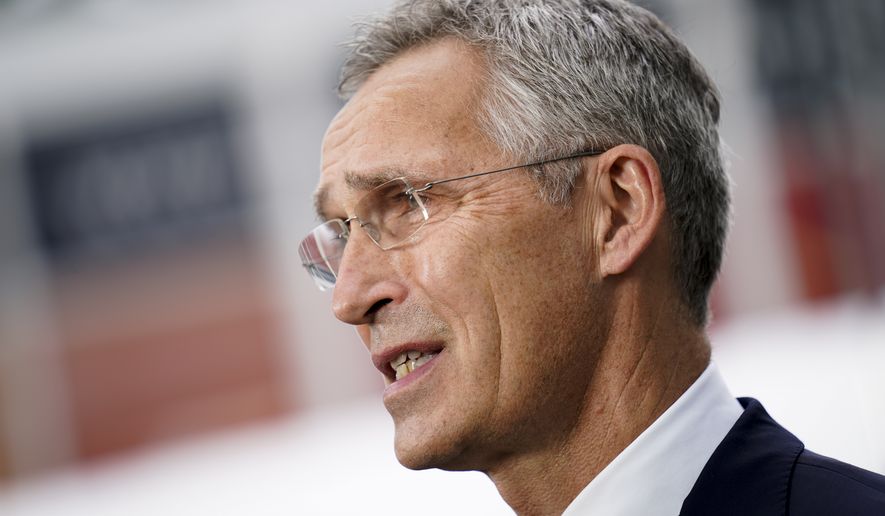U.S. and NATO officials worked overtime on both sides of the Atlantic on Tuesday to patch up rifts in the alliance and to tamp down tensions between key members on Afghanistan, a controversial submarine deal, China and other fronts.
In Washington, NATO Secretary-General Jens Stoltenberg used a major speech at Georgetown University to push back on the growing narrative that the Biden administration’s abrupt, unilateral military withdrawal from Afghanistan has sparked a backlash in Europe and fueled questions in NATO capitals about the reliability of the U.S. as a security partner. He also argued that Australia’s decision to spurn France and instead strike a nuclear submarine agreement with the U.S. and Britain hasn’t caused any long-term damage.
Regional analysts, however, say it remains to be seen whether the deal, commonly known as AUKUS, carries lasting effects. While France and the U.S. already are showing clear signs they want to move on, specialists contend that the relationship between Paris and London remains as strained as it has been in decades.
Mr. Stoltenberg, who met with President Biden on Monday on his first trip to Washington since the fall of Kabul, cited an aggressive Russia and the rise of a new global power, China, as reasons why it’s crucial that the U.S. and its NATO allies stay united to confront 21st-century threats.
“None of us can face these challenges alone — no country however big and no continent however rich, neither the U.S. or Europe alone. But in NATO we are not alone,” he said at a forum hosted by the Center for Strategic and International Studies.
“I understand France is disappointed” about the AUKUS deal, he said. “At the same time, NATO allies agree on the bigger picture that we need to stand together, also working with our Asia-Pacific partners. … The AUKUS deal is not directly against Europe or NATO.”
“If anything it’s more important that we stand together now because we are faced with such challenges. … For me the AUKUS deal doesn’t change that in any way,” he continued. “And also I’ve seen someone say that Afghanistan changed that. Not at all. If anything, Afghanistan just underlines the importance of NATO and Europe working together” with the U.S.
Meanwhile, Secretary of State Antony Blinken met with French President Emmanuel Macron in Paris on Tuesday in the clearest signal yet that the Biden administration is determined to mend fences with its longtime ally. Though the meeting was planned before the submarine deal, it took on a new level of importance this week. That meeting also is expected to serve as a precursor to a face-to-face conversation between Mr. Macron and Mr. Biden in the coming weeks.
Mr. Blinken also used a speech Tuesday at the multinational OECD to echo the message delivered by Mr. Stoltenberg in Washington: that it’s more important than ever for the West to stand as one.
“The principles at the heart of this organization and our democracies are being challenged by authoritarian governments that argue that their model is better at meeting people’s basic needs. Some of these same governments are actively seeking to undermine the rules-based order that’s been fundamental to security and prosperity for our countries for generations,” Mr. Blinken said.
“The stakes simply could not be higher,” he said.
But analysts say that both Mr. Stoltenberg and Mr. Blinken are trying to paper over major problems confronting the alliance and the tough behind-the-scenes work that must be done to repair damage. Of particular concern, they say, are relations between Britain and France on the heels of the AUKUS deal.
“That relationship is in the tank,” said Jim Townsend, former deputy assistant secretary of defense for European and NATO policy during the Obama administration.
“The U.K.-French spat doesn’t make other European nations feel very good either,” Mr. Townsend told The Washington Times in an interview this week. “There is worry in the alliance.”
Even as NATO leaders work to fix internal divisions, Mr. Stoltenberg said the alliance must also turn its attention outward. Eastern European nations vulnerable to Russian aggression need more assistance from NATO, even if they’re not formal members of the alliance, he said.
“We should provide more support, more training, more capacity-building, help them implement reforms, fight corruption, build their security and defense institutions,” he said, referring to Ukraine and other nations bordering Russia that aren’t full-fledged NATO members.
“We need to establish there is a lot in between nothing and full membership,” he said.
EU leaders, gathering in Slovenia ahead of a summit with Balkan nations Wednesday, were making it clear the reverberations from recent events have not died down, and that talk of beefing up a non-NATO European defense capability was still on the table despite the clear opposition of Mr. Stoltenberg.
“NATO is a security pillar on which we rely, and at the same time we see that we need to be able to act more autonomously to make our alliances stronger,” Charles Michel, president of the EU’s executive arm, told The Associated Press. “Strong allies make strong alliances.”
• Ben Wolfgang can be reached at bwolfgang@washingtontimes.com.




Please read our comment policy before commenting.